EENI Strategic Alliances with educational institutions
EENI Educational Partnerships (Universities, Business Schools, Organizations)
One of the activities of EENI Global Business School is to work together with educational institutions around the world (Universities, Business Schools, Chambers of Commerce, Business Associations, Institutions, etc.) on blended training projects (on-line + face-to-face training) related to foreign trade.
Doctorate in African Business, World Trade, Global Logistics.
Master in Business in Africa International Business, Foreign Trade, International Transport, Transport in Africa.
EENI has maintained educational alliances with institutions in Europe, America and Africa.

An educational project for online education in foreign trade and/or international business involves a strong initial investment in content and platform development, copyright, online education methodology, training of teachers and tutors, etc.
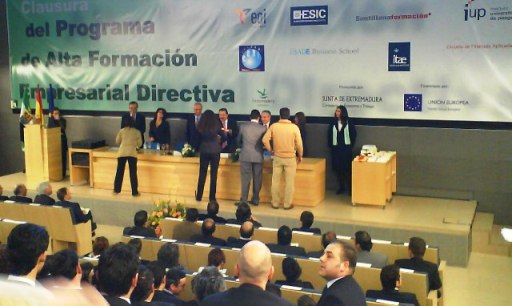
This is precisely our “core business” and what we can contribute to this alliance.
EENI Director of Strategic Alliances: Paterson Ngatchou
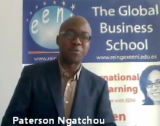
Training in foreign trade is increasingly complex. A Master's Degree in Foreign Trade has to have a global but at the same time regional and local focus.
By example, an Indian student who wishes to study a Master of Science in International Business should have:
|
EENI's main strength is its specialization in foreign trade and international business. Our training offer is adapted to more than 180 countries (including free trade agreements of each country, regional institutions, economic integration blocks, etc.) and available in several study languages (Spanish, English, French, Portuguese...).
Our network of international professors who are experts in foreign trade allows us to offer tutoring from Europe or Africa.

Educational Alliances
EENI offers educational institutions the possibility of jointly teaching higher education training programs (Masters and Doctorates) with co-degree from both institutions.
The training programs will be offered online or blended e-learning. The educational institution and the EENI will define the final content of the training program.
It is possible to design customized training programs, so that the educational institution can teach a part of the program both face-to-face and remotely. In this way, the content of the training program can be adapted to the reality of each country.
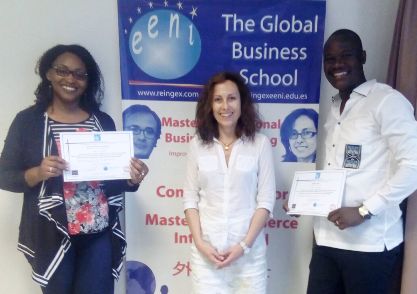
For example, in a blended Master's Degree in Foreign Trade, the local
institution can contribute (in face-to-face format) all its knowledge about its
country to the content of the Master: customs, ports, legislation, standards,
documents, country organizations related to foreign trade, success stories of
exporting companies, international relations of the country, etc.
Additionally, can schedule visits to companies, ports, customs, invite export
directors, etc. EENI provides the entire online part (content, e-campus,
tutors...).
Interregional Master's Degrees in Foreign Trade.
EENI is developing master's degrees that are taught jointly in the countries of a trading bloc. For example, a "Master in International Business - WAEMU" can be designed that can be taught simultaneously in all WAEMU countries (Benin, Burkina Faso, Ivory Coast, Guinea-Bissau, Mali, Niger, Senegal and Togo) with institutions local.
Principles of the Partnership
Our experience in this type of projects tells us that for an educational project of this nature to be successful, it must meet at least two characteristics:
- WIN-WIN strategy for both parties
- GLOCAL approach = GLObal + loCAL. EENI provides the global/regional, the institution the local
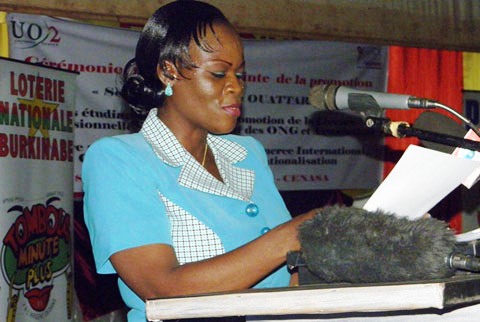
PhD Geneviève Barro, Director of the Master in International Trade in Burkina.
Educational institution:
- Manage local promotion of courses and student selection
- Manage registrations and collection of educational fees
- Student management
- Assign a coordinator - director of the training program of the part taught by the institution
- Monitor the quality of training
- Delivery and organization of the face-to-face part (if any)
- Participation in the correction of the thesis (in master's degrees)
- Management of final internships of the master's degree (if any)
- The Institution can also participate in tutorials for part of the subjects taught (agreed upon between the parties)
EENI Global Business School:
- Provide the contents of the training programs in digital format
- Launch the EENI e-learning platform (e-campus)
- Carry out tutoring for part of the subjects taught (agreed upon by the parties)
- Support the teachers of the educational institution
- Monitor the quality of training
- Final evaluation of the thesis (in master's degrees)
- Promote the training program on your sites and in your usual channels
The final price of the training program will be agreed between the parties, depending on what each of them contributes.
The Educational Institution that is interested in offering this type of training must formalize a collaboration agreement with EENI.
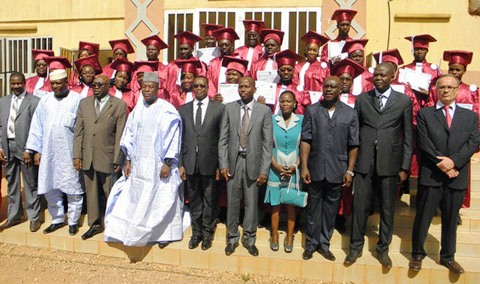
Master in Foreign Trade taught jointly with the University of Ouagadogou
(Burkina Faso).
e-Campus (E-learning platform)
EENI Global Business School has its own e-campus that will be adapted for the training program. EENI will give access to both students and teachers of the educational institution so that they can participate in the e-campus. The institution's professors have preferential access to the e-campus to be able to evaluate the evolution of each student.
Assessment
Each subject has its own exercises that the student must download from the e-Campus, solve and send to their teacher. In the case of a master's degree, a series of face-to-face semester exams are also established, the number of which will depend on the duration of the Master's degree, as well as the preparation of a final thesis (tutored online by the assigned professors). For the evaluation, the average grade obtained in the exercises, the face-to-face exams and the thesis (in the case of Masters) will be taken into account.
Tutorials by videoconference given by the EENI
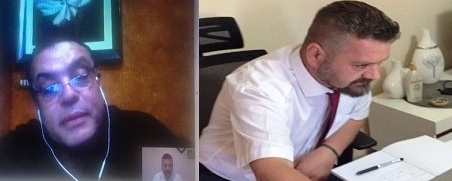
Co-Diploma
Students will obtain two diplomas: EENI diploma and the Educational Institution diploma.
Co-branding
The training program will be marketed in co-branding format, that is, with the brands of the educational institution and EENI.
Admission Form
The administrative managers of the educational institution and EENI will define the mandatory documents to be presented by the candidates.
Distribution of Fees
The distribution of the fees between the educational institution and EENI will be as agreed in the corresponding collaboration agreement, which will take into account what each party contributes.
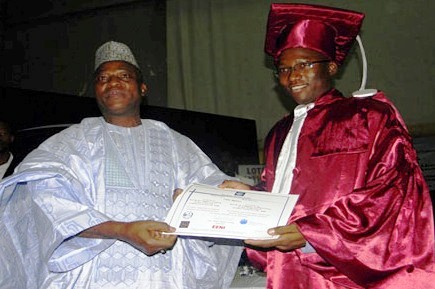
Diploma ceremony, led by His Excellency the President of the Economic and Social
Council of Burkina Faso, Mr Paramanga Ernest Yonli.
 EENI
EENI  Alliances stratégiques
Alliances stratégiques  EENI.
EENI.
(c) EENI Global Business School (1995-2024)
We do not use cookies
Top of this page



